John Janaro's Blog, page 97
May 23, 2021
Pentecost: Come Holy Spirit!
May 22, 2021
Made New in Holiness of Mind
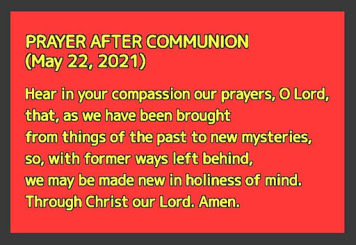 The Lord is compassionate. He reaches down to lift us up.
The Lord is compassionate. He reaches down to lift us up.In this season, I "have been brought" along this mysterious path that is my life, my vocation which is to journey toward Him, to journey with Him, to desire eternity and seek His glory, hidden in the circumstances of each day.
The "things of the past" and "former ways" are being "left behind." Indeed, "new mysteries" lay before me in this new moment of my vocation, my call to live for the glory of Christ and in Him to be "made new in holiness of mind."
I don't understand what this "holiness" means, and I know that I'm a long way from attaining it. Following along with my accommodation and application of the meaning of this prayer, I know that what the world needs - what my world needs, desperately - are transformed minds, minds of simplicity that see things as they really are and follow God's will, trusting in Him and His goodness amidst all the complicated, difficult, flawed, inspiring, beautiful things that lie ahead.
This transformation of our minds is the work of the Holy Spirit, who shows us the glory of the Risen Jesus whose light shines through into all the depths of existence, all the moments of history, all the paths of traveling through this life, every space (no matter how remote, no matter how desolate), every beat of every human heart.
Jesus Christ is Lord. Jesus is our brother. God is "Abba" - He is our loving Father and we are His children, brothers and sisters in Christ, called to love one another. Come, Holy Spirit! Make us new in holiness of mind! Give us hearts to seek His face, and to see one another in new ways.
May 21, 2021
The Light of the Holy Spirit
May 17, 2021
A Tribute to My Friend Tom Sullivan
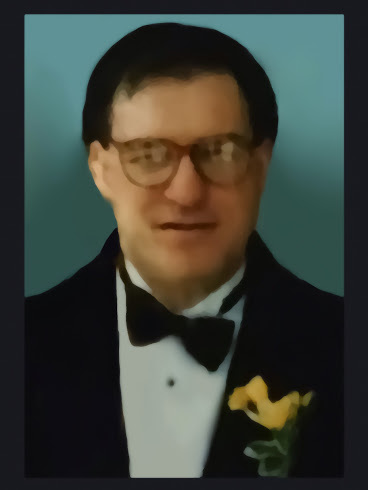 Today we "went to" the funeral of a dear friend of more than thirty years, Tom Sullivan. (I use quotation marks because — like so many other events over the past year — we "went to" it virtually, via livestream. But I was very grateful for this and various other virtual connections over the past two weeks.)
Today we "went to" the funeral of a dear friend of more than thirty years, Tom Sullivan. (I use quotation marks because — like so many other events over the past year — we "went to" it virtually, via livestream. But I was very grateful for this and various other virtual connections over the past two weeks.)Tom died of cancer last week. He was 60 years old. I have been trying to write these thoughts about him, but I kept procrastinating (something Tom would understand), but then also rewriting and changing parts of it and adding stuff. Nothing I say here, however, will be adequate to the memory of such a rich friendship.
Eileen and I got to know Tom very well through the Communion and Liberation movement. We were blessed to have him as one of my groomsmen at our wedding (which was almost 25 years ago). I went through a lot of old “snapshots” from that day looking for a good picture of him. But Tom was not a camera hog. (The best old pictures of him are from 30-ish years ago, shared by my friends, and they are nearly all funny group pictures.) All I could find from our wedding were a few general multi-person pictures, in which details of him can be seen in the background. This is the reason for the “mug shot” I have posted here, an attempt to digitally enhance a photographic glimpse of Tom, in the shadows, looking uncomfortable in his Tux (it was a very hot day). The truth is that no "still picture" can adequately represent his irrepressible personality and his enormous generous intelligence.
I hadn't seen much of Tom over the last decade, and he had been living in Houston for the past five years. Yet we had that kind of long-standing, deeply-rooted friendship full of common experiences and the mutual awareness of being on a journey together toward the fulfillment of life's meaning. I know we could have easily "picked up" communication at any moment, and (especially) gotten together personally without awkwardness and with lots to share from the intervening years.
If there is a "downside" to this kind of friendship, it is only in the way it can so easily be "taken for granted." Human adulthood seems to reach a kind of "plateau" that stretches out over several decades. Really, there is something of an illusion in all of this, but its a surprisingly stubborn illusion. You attain a kind of "status" (through your profession, your vocational life-commitments, etc.) which brings to some resolution the restlessness of youth. Once you're married, raising a family, and/or engaged in your life's work, you feel like you've reached a "level of life" that is just going to continue "forever" (or at least "for a long, long time"). Even in today's tumultuous world where we are constantly moving and changing places, jobs, interests — not to mention breaking vocational commitments, escaping responsibilities, or enduring traumatic interruptions and upheavals — we still retain some sense of this underlying "plateau" which we just take for granted as "normal life."
Meanwhile, the years fly by (tempus fugit, "time flies," — like all the classical human proverbs — has more experiential depth than we realize when we are young). And our middle-aged expectation that everything will always stay the same is frequently upended. The "plateau" is in fact a bumpy, twisting, turning, difficult but beautiful stretch of terrain on life's journey. We need to pay attention to the beauty. The difficulties, however, will be hard to ignore. The truth is that life, at every stage, is full of challenges and transitions that take us by surprise. In today's world, age 60 is still "too young to die," but it does happen. Nevertheless, we're not expecting the death of friends and colleagues from our own generation. We still "feel" like we're 30, at least in some respects, and we have felt that way for the past 30 years. It's too easy to take things (and people) for granted.
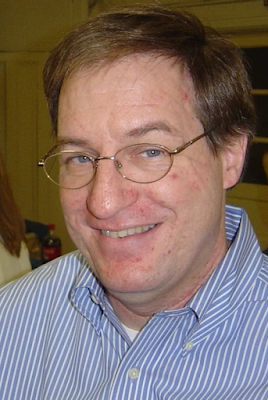 More recent and more characteristic picThis digression is a very long way of saying that I regret having "lost touch" with Tom in recent years. It was not from a lack of basic affection, but simply from the distraction that causes me to ignore so many other important things in life. Sure, I have been sick, he was far away, I am not a "telephone person," he was not on any social media, etc., etc., etc. but still, I regret my "forgetfulness." Tom's friendship has been a great gift in my life which I did not sufficiently appreciate. Still, I am grateful that we were able to accompany him — however "remotely" — in his last days, thanks to “real-time” updates from mutual friends who were at his bedside at the hospice in Houston, and our corresponding “real-time” prayer.
More recent and more characteristic picThis digression is a very long way of saying that I regret having "lost touch" with Tom in recent years. It was not from a lack of basic affection, but simply from the distraction that causes me to ignore so many other important things in life. Sure, I have been sick, he was far away, I am not a "telephone person," he was not on any social media, etc., etc., etc. but still, I regret my "forgetfulness." Tom's friendship has been a great gift in my life which I did not sufficiently appreciate. Still, I am grateful that we were able to accompany him — however "remotely" — in his last days, thanks to “real-time” updates from mutual friends who were at his bedside at the hospice in Houston, and our corresponding “real-time” prayer. Our prayer, of course, unites us through the definitive, unfailing, ultimate reality of “interpersonal communication” which is the “Mystical Body of Christ.” Jesus has been “lifted up” on the cross (cf John 12:32), in the resurrection, in glory, in the Spirit, in the life of the Church stretching through all of space and time. Jesus “draws all to himself” (cf John 12:32), making us members of His Body through our adherence to Him in faith, through Baptism and the Eucharist, the Sacraments and the life of the Church, and for us in the particular realization of ecclesial experience conveyed through the charism of CL. This communion is real and vital and transforming beyond anything we could establish by our efforts alone. Nevertheless, communications media can be helpful in serving to enrich our awareness of being united in Christ, and enable us to express it in new ways. It’s something I have been discovering (not without difficulty, frustrations, and mistakes) over the past 12 years, and something we have all been learning about since the Pandemic of 2020-2021-...202? and all its limitations on so many ordinary interactions.
Belonging to one another "in Christ" is a unity that transcends even the strange separation of death.
Here again, I seem to digress ... but not really: in any case, Tom would not only be pleased with my abundance of words, he would egg me on to even wider spheres of digression without ever losing the thread that holds them all together. He and I would follow this thread, but since others reading this might get confused (understandably) or even bored, let me get back on topic.😉
Tom Sullivan had a special gift for friendship, as many tributes have indicated. He was one of those rare people who was a great talker (oh boy, could he talk!) but also a great listener. I should know, because I can also talk (though I'm not as good at listening as I'd like to think). We had so many conversations about faith, politics, philosophy, culture, media, history, movies, music ... usually all of these themes would come up in a single conversation that was never organized but also never aimless.
Tom was a fountain of information about ... everything, and his interesting words and observations were always on hand. Back in the early days of the Internet, we used to joke that we could “surf” Tom just like we could “surf the web.” Just throw a word at Tom — any word — and he would talk about it. But he was not dull like a dictionary (I’m sure he could have verbally covered the dictionary but that wasn’t his style). He had anecdotes, witty observations, news stories, cultural references and it all came streaming out in a rapid yet articulate fashion.
So, for example, if you said the word “orange,” he could take you on a journey from Florida to California to Brazil, consider the controversy of organic versus GMO, ponder what makes the best tasting oranges... and then maybe jump off to “the Troubles” in Northern Ireland (“orange” being the color of the Protestants) which would lead to U2, new wave music bands in Great Britain, distinctions among the factions in European politics, two or three really good books you have to read, and..., and... you might find your way back to “orange” at some point (say, in a consideration of the best cocktails that use orange juice).
I remember getting together for breakfast on a Saturday morning with Tom and another friend at one of those nice Washington DC cafes that were a “new thing” back in the ‘90s. It was pretty early, before 9AM. There we were, three brainiacs getting breakfast and talking and talking and getting refills of coffee and talking and talking and getting more coffee and talking... and then we saw people coming in and receiving different menus. It was lunchtime! Talking (and listening) takes a lot of energy, and we were far from “finished,” so we went ahead and had lunch. And talked and talked and totally outlasted the lunch crowd. We did leave, finally... probably because the place didn’t serve dinner!
There was one time when Tom and I were forced to stop talking. It was because we suddenly faced a battle for survival against the forces of nature! This story — gosh! — they could do a whole documentary on the Weather Channel using just our experience. It was the first weekend of January 1996 (if you're old enough you might remember the famous northeastern USA "Blizzard of '96").
That weekend we had some kind of regional CL pow-wow at a retreat center near the very end of Long Island. Montawk Point was nearby, and New York City was more than three hours to the west. Lorenzo Albacete was there, and he was "Lorenzo-ing"(😉) all day Saturday, while occasionally we heard increasingly ominous weather reports about an incoming snowstorm. Lorenzo somehow got out of there Saturday night (maybe by helicopter, I don't know), but we all decided to leave "around noon" on Sunday. When we set off from Montawk, there wasn't a flake to be seen. Tom and I had driven in his car. Other friends had taken various other cars. We thought we'd get through okay and beat the storm (which was really a moment of collective irrationality on all our parts, or at least it was "wishful thinking" — getting stuck in Montawk didn't seem like a viable option). But not even the weather forecasters were expecting what ended up happening (3-4 feet of snow!).
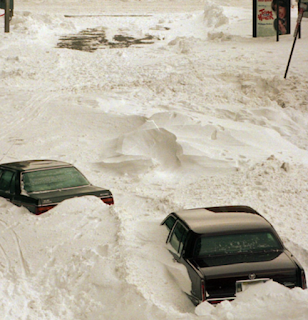 Yes, like THIS!We drove for more than two hours and it was easy-peasy. I'm sure we talked about all the problems of the world during that time, while the snow started to trickle down. Traffic was moving normally, at first. Then came more snow. And more snow. And more snow. But the highway was full of cars and they kept driving, so we kept driving. Around the time we reached the Staten Island Freeway, it got crazy! It was like the sky just started dumping buckets of snow. Traffic came to a virtual standstill on this packed highway. There was no way to get off the road, and no where to go. We would drive a couple of inches, and then I would have to get out of the car and clear several inches of snow from the windshield. Tom and I looked at each other and said, "we're gonna die out here!" So it was just basically "Hail Marys" after that. We just kept crawling and clearing the windshield, crawling and clearing the windshield. It was 1996 so we didn't have cell phones or GPS or a clue as to where we were. Finally an exit ramp appeared in the midst of the squall and we found ourselves in some area of Staten Island, on streets where plowing had been attempted but at best it turned the streets into ice sheets. The car was like 99% out of control, just sliding wherever there was space for it to go.
Yes, like THIS!We drove for more than two hours and it was easy-peasy. I'm sure we talked about all the problems of the world during that time, while the snow started to trickle down. Traffic was moving normally, at first. Then came more snow. And more snow. And more snow. But the highway was full of cars and they kept driving, so we kept driving. Around the time we reached the Staten Island Freeway, it got crazy! It was like the sky just started dumping buckets of snow. Traffic came to a virtual standstill on this packed highway. There was no way to get off the road, and no where to go. We would drive a couple of inches, and then I would have to get out of the car and clear several inches of snow from the windshield. Tom and I looked at each other and said, "we're gonna die out here!" So it was just basically "Hail Marys" after that. We just kept crawling and clearing the windshield, crawling and clearing the windshield. It was 1996 so we didn't have cell phones or GPS or a clue as to where we were. Finally an exit ramp appeared in the midst of the squall and we found ourselves in some area of Staten Island, on streets where plowing had been attempted but at best it turned the streets into ice sheets. The car was like 99% out of control, just sliding wherever there was space for it to go.And then, shining up in the sky, we saw a sign. It was an amazing sign that gave us hope! Red letters glowed in the sky and they said "STATEN ISLAND HOTEL." (New Yorkers, if you drive in this area, you've seen this many times, because it's on top of the tallest building around, a Holiday Inn [and you're a long way from the skyscrapers of Manhattan]). I don't remember how we managed to get to the parking lot (the angels must have carried the car). A bunch of our friends ended up stranded in the same place. But the hotel had plenty of rooms. And there was a bar (😉🍻🍺🍷🍹). We all ended up stuck in this hotel for three days. The whole East and Mid-Atlantic was basically closed — it was ... COVID-esque ... in the sense of being confined and everything being shut down, at least. The hotel even ran out of bread and started serving toasted hot dog buns with breakfast. Thankfully, however, the bar did not run dry.
Anyway, Tom would tell the story better than I am. After 25 years, it's a humorous memory. It was a rare experience with Tom that did not involve vivid conversation.
Tom was full of so much varied knowledge, but I want to stress that he was not a “show-off.” He was really interested in all these things, in what they revealed, in the questions they raised. He took you on an adventure of inquiry along the scattered and cluttered paths of his mind, but you never felt “lost.” There was focus at the heart of it all; Tom was driven by the search for meaning — indeed the need for meaning, the hunger and thirst for meaning, and the confidence that there was meaning — that things ultimately didn’t fall apart. They came together and found their peace.
His peculiar awareness of particular facets of reality was especially surprising when you realized how much he knew about you, your needs, you special interests, your likes and dislikes, and how much he valued you as a person. Here his penetrating knowledge was not looking at your faults, much less for material for gossip. It was entirely dedicated to concerned and courteous service, affirmation, and generosity. His friendship for you was deeply particular, yet there were many other people that he also cared for — each in a manner suited to them.
He often surprised me this way. Sometimes he even reminded me of things I had forgotten I was interested in. And his awareness of my interests let to gestures that corresponded to it. There were, of course, often books and articles recommended and even procured. But what I especially appreciated was how Tom was always attuned to my love for music. Indeed, he shared it, and — like me — he was interested in affirming positive elements in contemporary popular music (while not ignoring the overall decadent cultural context that so often compromised or distorted other elements that pervaded the music scene).
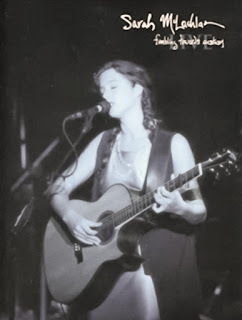 Yeah, really young Sarah
Yeah, really young SarahWhen I returned to the States after a year in Italy, the first CD I bought was by a young Canadian artist (very young at the time) who was just beginning to get attention in the U.S.A. I went home, popped on my headphones, and put Sarah McLachlan's Fumbling Toward Ecstasy into the CD player. I don't know if you kids today can appreciate what it was like to hear for the first time some of these wonderfully innovative sounds that artists were introducing in the early '90's. Anyway, this album knocked my socks off! (I still think it was her best...) I told Tom and, well, he had known about her since her earliest stuff in Canada, and had interviewed her and written two articles for his newspaper (his work there was actually related to the editorial page, but he would also do articles on music and the arts on his own time, and the paper would publish them — much to their advantage, I think). Anyway, some months went by and Sarah's star was rising rapidly. She and her band came through DC to play the sold-out Warner Theater (she was still playing smaller venues back then). Tom called me up and said, "I've got two free tickets from her management because of my articles. Wanna go?" Row 12, right in the middle. If we had been any closer we would have been on stage. Great seats for what was a music show (not an exotic circus like some concerts can be). But Tom remembered my appreciation for the young Sarah McLachlan. It seems like such a small, insignificant thing when I write about it here, but it expressed his particular friendship in a manner that stands out in my memory, and that represents countless other gestures that were basic features of Tom's approach to people.
Another time, there was a group that made a ripple in the early '90's music scene. They were called The Innocence Mission, and Eileen and I were both big fans. They kept making good music even after the "music spotlight" had moved on to other styles (styles that were cheaper, flashier stuff, alas...). The Innocence Mission was still recording and touring clubs in the later '90's and came to the DC area. Tom had an idea: "let's interview them for the CL magazine" ... and he had the connections to make it happen. Tom and Eileen and I ended up spending a delightful hour backstage with Don and Karen Peris (husband and wife, guitarist and lead singer), and we wrote a very appreciative article that was published in the magazine.
How do I keep this tribute to Tom Sullivan from turning into an article about music, or politics, or "all-the-things"? What a rich life this man lived, even though he had little of value in material goods and was disorganized with the few things he did have. His clutter was legendary (in this he was a kindred spirit, if not an inspiration, for me). But he always (eventually) found that book or article or whatever it was he wanted to share with me. His many "ordinary" gestures of companionship added up to a kind of attentiveness and self-giving that had an "extraordinary" quality.
As I look back, I wonder if this capacity for friendship might have been a special gift from God — indeed, I think Tom was a powerful example of a particular “opening up” of Christian hospitality (as an expression of mercy, a work of mercy) that the Lord sometimes gives to people who live their baptismal vocation as single persons in the midst of the world. Without any particular “consecration,” without even a determination “never to marry,” but simply with the daily intent to follow Jesus within the circumstances of life as they are here and now given to them, many single Christian men and women have the freedom of time and attention that permits them to practice a great “hospitality of heart” toward those around them. Single people also have been created to love and to be loved. It is a special gift, and one much needed in this time of so much alienation, loneliness, and interpersonal violence.
I don’t know why Tom never married. Many single people in their older years may feel that they have “missed out” on a full human life, that they are failures, that there is something “unlovable” about them. (And it’s no comfort to them to tell them that many married people also feel this way.) Single people have fewer spaces to hide from their own vulnerability. It is a kind of poverty, but by God’s grace it takes the shape of the poverty of the Beatitudes. It is blessed, and leads to further blessings when it becomes a special capacity for being merciful.
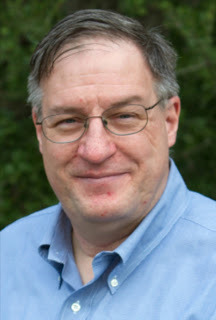 Tom was a merciful man. He accompanied people. It meant everything to him, of course, that he was loved by Jesus with a love that was concrete and expressed in the Church and through the ecclesial charism of CL. He didn’t allow this to be reduced to a place of “safety,” or an exclusive club; rather he sought to share this love within the whole range of human particularity that he dealt with every day, and among many friends, co-workers, writers, political and cultural figures, and a great variety of people he met as a newspaper staff member, writer, journalist and editor, and as an administrator in publishing and academia.
Tom was a merciful man. He accompanied people. It meant everything to him, of course, that he was loved by Jesus with a love that was concrete and expressed in the Church and through the ecclesial charism of CL. He didn’t allow this to be reduced to a place of “safety,” or an exclusive club; rather he sought to share this love within the whole range of human particularity that he dealt with every day, and among many friends, co-workers, writers, political and cultural figures, and a great variety of people he met as a newspaper staff member, writer, journalist and editor, and as an administrator in publishing and academia.He gave greatly from himself. Yet people who spoke to Tom near the end of his life remarked on his simple expressions of gratitude for the love they had given to him. Tom Sullivan was, and remains, much loved by all of us, and he remains a sign of Christ's enduring love. Of course, those of us who remain in this world miss his earthly presence. Even when we believe that Jesus has conquered death, it remains mysterious to us. It is obscure, and causes sorrow.
Goodbye Tom, old friend!
Lord, grant him eternal rest, and the joy of eternal life through Jesus Christ, in the communion of saints. Grant that we may all be together with You forever, O Lord. Have mercy on us!
If we grieve, that does not mean that we lack hope. Grief is part of the journey of this life, and we have tears that only God can wipe away.
May 16, 2021
Agnese Graduates From University

*********************************************************************************Agnese Janaro, B.A., Magna Cum Laude!!!🎉
This blog has followed the journey of all our kids during a decade in which most of them went from children to adults. Back in 2011, our eldest daughter Agnese was (only) 12 years old (‼️). We have seen her receive the sacrament of Confirmation, and progress from John XXIII Montessori Center to Chelsea Academy (where she graduated High School in 2017) to the completion of her university studies at Christendom College, with a major in Literature.
Above we see the new graduate with her proud parents. Her Dad once again donned the professorial garb of the institution where he is Emeritus Professor and where he taught for many years - when she was very small - before health problems necessitated his retirement from the classroom.
I don’t know where the time has gone, but Agnese is “all grown up.” Nevertheless, she has a job in the area, so we will still see her, at least (when she can make it) at what is becoming a “new tradition” of the Sunday afternoon family “hangout.”
Of course, EVERYTHING may change in July, when Agnese’s niece make her grand “natal debut” and revolutionizes the lives of John Paul and Emily (haha, what fun!🤪☺️) and the new giddy grandparents (😉🙂), as well as the aunties and the “great uncle.” Stay tuned for a wild Summer 2021 and after...
For now, congratulations Agnese! What a wonderful young lady you have become. We love you!❤
May 13, 2021
Forty Years Ago: John Paul II and the Precipice of History
 Left: Our Lady of Fatima / Right: John Paul II collapses after being struck by assassin's bullet
Left: Our Lady of Fatima / Right: John Paul II collapses after being struck by assassin's bullet***************************************************
May 13th.
I usually mark this day every year on the blog. On May 13, 1917 — while Europe was in the grip of an unprecedentedly violent, senseless, fratricidal war — Mary, the mother of Our Lord Jesus Christ, the Theotokos, the tender and merciful mother of all of us — first appeared to three peasant children in Fatima, Portugal: Saint Francisco, Saint Jacinta, and the Servant of God Lucia.
In the ensuing months, Mary taught them many things. She asked great sufferings from these children, showing them the depths of the evil of sin, and the terrors of hell which are the fruit of the utter contradiction between the boundless love of God and the self-violence of those who choose the nothingness of sin.
In seeing these horrors in one of their visions, the children of Fatima were also given special graces to implore God's mercy for sinners, unite themselves with Jesus in their own sufferings, and share in His work of "reparation" for the sins of the world. God does not want anyone to be lost in the fires of hell. God does not want anyone to choose to plunge into that endless burning vortex of nihilistic self-centeredness. God created us for the transfiguring joy of the "fire" that His glory infuses into those who receive Him. "God did not make death, nor does he rejoice in the destruction of the living... It was the wicked who with hands and words invited death, considered it a friend, and pined for it, and made a covenant with it" (Wisdom 1:13, 16).
God took flesh in the womb of the Virgin Mary to save us.And so the children of Fatima learned and passed on to us that great prayer, that plea for Divine Mercy that we pray at the end of every decade of the Rosary: "O my Jesus, forgive us our sins. Save us from the fires of hell. Lead all souls to heaven especially those who are most in need of thy mercy!"
We need to stay with Jesus, trust in His merciful love, and pray that hearts will open to Him. Today we live in a world in which more people than ever benefit from advances in material power, where there is a broad diffusion of general (albeit confused) sentiment for human solidarity, but also a widespread absense of awareness of human transcendence — of the human vocation to seek the Mystery of God who has revealed and given Himself in Jesus Christ.
Without God, human existence becomes an insoluble riddle, in which the desire for goodness — however sincere — is frustrated by its own ambivalence, and where doing evil too often seems tragically inescapable or simply expedient. Ignoring our dependence on God, and ignoring our need for His salvation from our sins, has led to a twisting of even the most noble human aspirations toward the service of dark and monstrous aberrations. Here indeed we find many examples from the history of the twentieth century, and we can see the timeliness of Mary's appeal for conversion, prayer, and penance at Fatima, while that century was still young. She called on us to take refuge in her Immaculate Heart and to pray the Rosary so that we might draw closer to Christ's love and be instruments of His mercy in the world.
I remember May 13th every year for another reason, for an event that took place in my own lifetime.
Forty years ago — on May 13, 1981 — the goodness of God and the maternal solicitude of the Blessed Mother brought great mercy to the world, so that a singular witness of Christ's truth and love might continue to shine on this earth for nearly 24 more years, and also (perhaps) so that terrestrial history itself would draw back from the brink of destruction.
It is difficult to convey the atmosphere of the world in which I grew up. The ideology of Communism — a utopian atheistic materialism — held part of the world in a seemingly unbreakable iron grip. Much of the rest of the world labored under the confusion and reductionism of the de-facto consumerist materialism of the decadent West. People everywhere lived under the shadow of intercontinental ballistic missiles armed with nuclear weapons powerful enough to destroy the world many times over.
The world we live in today still has many of these problems (and others as well), and yet I am inclined to believe that the depth of the sudden and irrevocable danger that humanity as a whole faces has diminished somewhat from those days in 1981. A little more than two years earlier, a "young" Polish bishop (he was my current age, 58) was elected Pope John Paul II. In 1979, he visited his native land where people lived under communism. He assured them of Christ's love and he reaffirmed their rights as human persons. Poland was stirred with a new hope, and the next year (1980) saw the birth of the first independent trade union in the communist world — Solidarity — that stood up to the Soviet-Union-controlled Polish communist government and won important concessions.
The hard line ideologues who controlled the Soviet Communist Party (and de-facto nearly all the other Communist Parties in Eastern Europe) concluded that this new Pope was a dangerous man. He had to be eliminated.
A Turkish professional assassin — Mehmet Ali Agca — was hired through the Bulgarian Secret Police. He entered Saint Peter's Square on May 13, 1981 and fired two shots at close range, and the Pope fell. It was a textbook assassination, with one bullet entering the abdomen, ordinarily a guaranteed fatal shot.
But Pope John Paul II did not die on May 13, 1981. In one of the visions of 1917, the Fatima children saw a "bishop in white" felled by gunfire. Mary had told them that "the Holy Father would have much to suffer." John Paul II did suffer much, from this wound and its after-effects, as well as from many other things. But the bullet "miraculously" (it seemed) did not fatally damage any major organs.
Instead John Paul II lived to see the fall of communism in Poland and Eastern Europe by the end of that decade, and the fall of the Soviet Union two years later. He lived, regained his health, traveled the world, preached the gospel, led countless human hearts to a decisive encounter with Jesus Christ and encouraged many more to persevere in following Christ, to trust in His mercy... and to love, venerate, and rely upon the maternal tenderness of His Mother's Heart.
"One hand pulled the trigger; another hand guided the bullet," Saint John Paul II said. Through his epic ministry over the next quarter-century (and even today, through his intercession among the saints), John Paul II has been an instrument of Jesus's saving love and mercy toward those on the brink of hell, and maybe also toward human history teetering on the precipice of destruction.
May 12, 2021
Mary's Maternal Protection
“Let us entrust the Church, ourselves and the whole world to the Immaculate Heart of Mary. Let us pray for peace, for the end of the pandemic, for a spirit of penitence and for our conversion. Let us place ourselves with trust under her maternal protection" (Pope Francis — General Audience, May 12, 2021).
[image error]May 10, 2021
Christina Grimmie, Music, and Me: A Personal Story
 [Credit to owners for the original pictures on which these artwork/designs are based.]
[Credit to owners for the original pictures on which these artwork/designs are based.]It doesn’t seem so long ago that I wrote about the phenomenon of Christina Grimmie for the first time. In fact, it has been nearly five years. I wrote with astonishment back in June 2016, because I had begun to realize that I had encountered something mysterious in the very last place I had ever expected to find it.
There seems always to be a cresting wave of young singers, musicians, artists, and performers full of talent and aspirations. I have kept my eye on it (more or less) for many years, but the wave is so big that no one can see everything that sparkles. And then the sparkles fade so quickly when the wave crashes onto the shore and the waters recede. It seems all a spectacle of momentary glitter, of ephemeral flashes of light that become monotonous and practically indistinguishable the more familiar you are with the shore. And then you begin to turn cynical when you start to realize how polluted the water has become.
How incredible it is when one day a diamond washes up on the beach.
I am descended from a long line of Opera lovers, and so it's not surprising that I love a "good show." As a musician who played many gigs in my youth, I also know that a lot of hard work goes into making a good show, and that "performance" isn't simply driven by an ego trip (though it can degenerate toward that). Performing artists have an irrepressible urge to give something beautiful and valuable to people, and the best ones have a kind of "genius" for it.
Performers are motivated by the ideal of a great show, but are often disappointed at its elusiveness. Even when achieved, it is soon forgotten and the public demands an even better show. Many performing artists find this pressure overwhelming (though there are a few who actually thrive on it).
When I was young, I has musical aspirations that were quite strong, along with no small talent: I was classically trained on the cello, and played in my high school orchestra, Pittsburgh's All City orchestra, and a remarkable private venture called the Ozanam Jazz Group (we once shared the stage with the legendary Count Basie). Meanwhile, I was also self-taught on the guitar, jammed and played in garage bands, and wrote a number of instrumental songs. The musical road was a viable option for me to pursue as the decade of the 1980s began. But I had other options that were ultimately more compelling, that led me to pursue advanced academic studies, teaching, and the intellectual life. That doesn't mean I gave up music. I kept playing (though much less since the decline of my health) and I kept my eye on the musical world - both classical and popular - where I continued to discover much that was excellent. I also heard a lot of music of lesser quality and some that was just junk.
I have also seen a great deal of real talent spoiled: artists are simultaneously indulged and overworked, their own vision thwarted and replaced with superficial material, their performances marred by excess and exhibitionism, cheap spectacle, emotional manipulation, smugness, confusion, nihilism, exhaustion. The big music world grows more monstrous (like everything in this epoch of power), more artificial, more banal.
 I realize (from personal experience) that artists can be a bit wacky, and that you won't see creativity if you don't allow some "space" for their wackiness. I also know that performers are moved by an incessant impetus, a peculiarly talented but in some ways chaotic energy that requires immense effort for it to be forged into an integrated human virtue. Many great artists fall short, but I think we can appreciate their struggles and whatever beauty and goodness can be found in their ambivalent success without endorsing their weaknesses and failures, much less proposing them as moral exemplars. Even in the classical period, there were artists who wrote and performed sublime music but were much less admirable in the "art" of behaving like decent human beings.
I realize (from personal experience) that artists can be a bit wacky, and that you won't see creativity if you don't allow some "space" for their wackiness. I also know that performers are moved by an incessant impetus, a peculiarly talented but in some ways chaotic energy that requires immense effort for it to be forged into an integrated human virtue. Many great artists fall short, but I think we can appreciate their struggles and whatever beauty and goodness can be found in their ambivalent success without endorsing their weaknesses and failures, much less proposing them as moral exemplars. Even in the classical period, there were artists who wrote and performed sublime music but were much less admirable in the "art" of behaving like decent human beings.
Thus, I have continued to listen to all kinds of music, even as I mourn the plight of the artist-celebrity and note also the way it often spills over into his or her work. When I write about musicians and other artists on this blog, I don't usually recommend their stuff for your kids; certainly your kids need to learn discernment, and it is helpful if they grow up in a pedagogical environment that fosters the education of the heart to authentic freedom.
Still, I have always loved music overall, and I loved the drama of seeing people take the stage to sing or play their hearts out, putting themselves into an achingly vulnerable position because the deep human desire to be creative, to give something from their talents, to touch the mystery of creativity had stirred them to take such tremendous risks. I loved it, but I never expected to find anything more than good music and some signs of that exquisite, desperate but determined human longing for meaning, value, and permanence. I hoped that somehow the momentary flash of light on the foam of the wave that disappears might suggest to the desire of my heart that there is a beauty that endures, that prevails, that continues to shine.
But I never expected to find a diamond on the shore of the murky sea of popular music.
In 2016, I was living in a house full of teenagers. (It wasn't quite as bad as it sounds!😉) This was a Catholic Christian household that my wife and I did our best to sustain through prayer and charity and bounderies that were essential without being onerous (see the earlier years of this blog). We were trying to guide the kids to maturity within an atmosphere that would facilitate a deeper encounter and relationship with Jesus, a committed following of Him in the Church, and a renewed mind - not conformed to "the world" (i.e. the world of sin and its effects, the "structures of sin" that reject and oppose the love of God in Christ) but able to discern, to "test everything" and hold fast to the good.
We weren't alone either. We also had an excellent school and a good community - not fanatical, not puritanical, but just solid, with some very special friends to help us to remember that we belonged to Christ.
It was far from a perfect home. I'm sure we made many more mistakes than we know. In any case, there was an abundance of music and movies in the house, and a variety of tastes, which made things confusing but also interesting.
Meanwhile, in 2016 I was (and still am, somewhat) recuperating from a long illness. I spent some time studying and engaging with the constantly developing media technology and its various consequences, including the new possibilities that were being opened up for music. Mostly I was "put off" by the big pop stars, but places like YouTube were alive with creativity. If you were just tuning in to the scene, there was a lot going on by the middle of the last decade. It was easy to see Christina Grimmie as just one among many, from my (scattered, inattentive) vantage point.
My focus in those days was drawn more to others, like that girl who danced and played electric violin (I mean Lindsey Stirling, of course) -- anyone who played a classical stringed instrument in my youth dreamed of being able to "plug in" and have the sonic "weight" to really jam. (When I was a kid, I bought a Radio Shack "transducer" for my cello: it was a suction cup with a cheap mike in it that you were supposed to stick on your instrument and plug into the stereo. Radio Shack did a lot to bring joy to my childhood... but not with this disappointing piece of low-tech!😜) Also, five, six, seven years ago, there were some YouTubers crossing over to the mainstream: back then I was more familiar with Tori Kelly and Alessia Cara (both terrific singer-songwriter-instrumentalists) than I was with Christina. (I still tell people to pay attention when they listen to Christina, to appreciate all the superb features and versatility of her voice.)
 And then came June 10, 2016 ... and all the tributes and effusive praise and sorrow from famous people and ordinary people all over the Internet. That's when I realized I had to learn more about Christina. I found out how many YouTube videos she had, how far back they went, how "novel" all of these kinds of homemade webcam song covers were back in 2009. In the beginning, some people did karaoke covers for fun, but 15-year-old Christina made her own arrangements for her piano keyboard, and played them while she sang. She was making the videos herself, without fancy gadgets, with a simple microphone. She was a kid in her room in New Jersey, with a poster of Sonic the Hedgehog behind her on the wall, and she was making freaking history!
And then came June 10, 2016 ... and all the tributes and effusive praise and sorrow from famous people and ordinary people all over the Internet. That's when I realized I had to learn more about Christina. I found out how many YouTube videos she had, how far back they went, how "novel" all of these kinds of homemade webcam song covers were back in 2009. In the beginning, some people did karaoke covers for fun, but 15-year-old Christina made her own arrangements for her piano keyboard, and played them while she sang. She was making the videos herself, without fancy gadgets, with a simple microphone. She was a kid in her room in New Jersey, with a poster of Sonic the Hedgehog behind her on the wall, and she was making freaking history!Christina's legacy is "history" in so many ways. She was an amazing person - which is ultimately more important - but what got my attention and helped me to see something of her great personality was her prodigious music.
From the beginning, in 2009, her voice was remarkable and her musicality was impressive. Then she rapidly began to mature even more in her vocals. Her dynamics are still among the best I have ever heard: from a booming belt to soft, gentle notes with flawless and apparently effortless transitions, Christina had incredible vocal control that didn't sound "controlling" or forced but almost spontaneous. Her head voice continued to expand and the resonance - already stunning - was widening out in her chest. By the age of 17, her voice was beautiful, stunning, brilliant, poignant, soothing, soulful - a magnificent instrument of the whole range of emotional expressiveness.
The most amazing thing was that she was so young. Her potential as a vocalist was still developing. Recordings from her last concerts and live appearances suggest that she was rapidly growing more supple, richer in tone (if that's possible), and that her range was expanding. Christina loved to full-on belt, of course, and it made for some of her most epic moments. It was large pitch-perfect sound from such a small girl, but also a young girl. Something of that youthfulness remained in her belts, and if she had been granted the years to mature to her full adult stature, this would have grown into a kind of fullness that I can't even imagine. She would have shaken the earth.
The voice we did hear up to age 22 was, I believe, great enough and unique enough to establish her ineradicable musical legacy. I am quite sure that in the future she will be remembered and appreciated as one of the greatest singers of our time. She will certainly never go out of style.
 I have said a lot in previous articles about Christina's faith. I remember being really struck by how so many people (Christians and non-Christians alike) talked about the impact of her faith on them in those days following June 10, 2016. Yet it didn't seem like she mentioned it herself all that often. With a couple of exceptions, she didn't cover "Christian songs" at all. But she did speak about Jesus and refer to his love in moments when she was moved to express it. And as I watched more and more of the videos, I began to realize that her belonging to Jesus Christ was the foundation of everything she did.
I have said a lot in previous articles about Christina's faith. I remember being really struck by how so many people (Christians and non-Christians alike) talked about the impact of her faith on them in those days following June 10, 2016. Yet it didn't seem like she mentioned it herself all that often. With a couple of exceptions, she didn't cover "Christian songs" at all. But she did speak about Jesus and refer to his love in moments when she was moved to express it. And as I watched more and more of the videos, I began to realize that her belonging to Jesus Christ was the foundation of everything she did. This was the secret of her vast magnanimous open-hearted humanity. She was utterly genuine. She was unscripted. Shy at first, then funny, goofy, direct, self-deprecating... until she started playing and singing with intensity, focused passion, and... I feel like I want to say... "authority." She "owned" the songs she sang and played - not only those of her own composition but also her covers (which were often just plain better than the originals, but were always presented and articulated in her own inimitable way).
When Christina did have something to say by way of advice or encouragement - whether on YouTube or her busy and very interactive Twitter page - there was power in her words. She was simple, direct, personal, strong, tender, loving, and wise - without ever ceasing to be an approachable teenager/young-adult who was at home with her adolescent frands, and open to everyone. She might use a simple common phrase, but - coming from her - even apparent clichés like "be yourself" were the opposite of evasive generalizations. We know that absolutely everybody says "be yourself." But from Grimmie, you hear it differently. It suddenly comes alive, like a provocation and a challenge.
At a certain point, it began to dawn on me that I was no longer "educating myself about someone important in music and media" in the first half of the last decade. I was meeting a real person and she was helping me see things in a new way. She was helping me to recognize the love of God shining in places I knew nothing about, or places I might have considered "too dark" for any light to make a way. She was convincing me that the people "on the margins," people with unremarkable lives, people with problems, sick people, disabled people - people like me - really do matter. We are loved. I am loved.
And this love is greater, stronger, "deeper" than death.
May 9, 2021
"You Are Beside Me"
"In life, the worst anxiety, arises from the sensation of not being able to cope. We need Jesus’ help. And so we can say to Him: 'Jesus, I believe you are beside me and that you are listening to me. I bring to you my troubles. I have faith in you and I entrust myself to you'" (Pope Francis).

May 7, 2021
Hong Kong: A New Phase of Suffering and Patience
 In Hong Kong, the Repression against the pro-Democracy movement goes on, through the relentless machinery of the Chinese Communist PartyState's bureaucracy and its implementation and enforcement of codified decrees (which has been called "Lawfare"). Arrests continue to be made on alleged violations of "national security." Meanwhile, convictions and heavy sentences are still being handed down in relation to the 2019 protests.
In Hong Kong, the Repression against the pro-Democracy movement goes on, through the relentless machinery of the Chinese Communist PartyState's bureaucracy and its implementation and enforcement of codified decrees (which has been called "Lawfare"). Arrests continue to be made on alleged violations of "national security." Meanwhile, convictions and heavy sentences are still being handed down in relation to the 2019 protests.The remarkable young activist Joshua Wong - already serving a prison term for one protest - had his sentence extended on a further conviction for another protest. He also faces charges under the new National Security Law.
He may end up spending a long time behind bars as Beijing continues the crackdown which is dismantling what was left of Hong Kong's autonomous status. My hope and prayer is that Joshua Wong (following in the tradition of the practice of Non-Violence) will endure suffering in prison with hope, and allow it to form him as a mature, magnanimous, and wise statesman for the future.
There will be much need of him, and others of his generation, to be leaders in the future when, God willing, the time will be ripe for Hong Kongers (and others) to attain political freedom.





